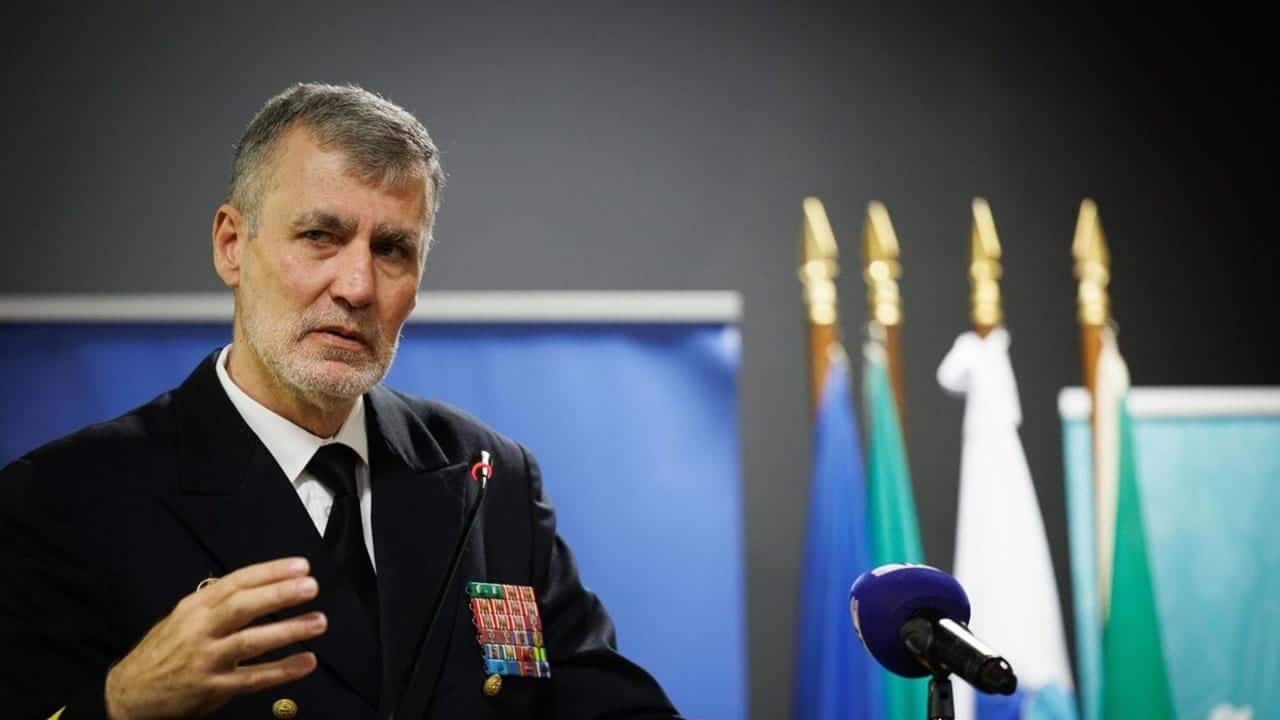Portugal’s naval chief returns to “idea of conflict extending to other European nations”
Portugal’s Chief of Staff of the Navy, Admiral Gouveia e Melo, has returned to warning about the possibility of military conflict “extending to other European nations”.
“A very serious problem is looming in Europe. The Russian Federation’s invasion of an independent country, Ukraine, has changed international behaviour”, he told interviewers from TSF Rádio/ Diário de Notícias.
“This change could be so structural that it could destroy the bases we have today.
“By destroying these bases, everything that we take for granted today, which is security in Europe, NATO, the European Union – which are essential pillars for our security and prosperity – could be jeopardised”.
It was an interview that highlighted the dichotomy of the times: Portugal is in the grip of politicians arguing a great deal, often over minutiae, when the country’s armed forces are acutely aware of how fragile Europe’s freedom to argue over minutiae has become.
Almost exactly a year ago, Gouveia e Melo gave a powerful speech on the fact that democracy is not inevitable.
In this latest interview, the admiral referred to “unpleasant situations” that have occurred at sea recently, when ‘accompanying’ Russian vessels through territorial waters.
“I’m not going to mention specific operational issues here, but not only with us but also with the Air Force, situations have happened that normally, in the periods prior to this period of tension, would never have happened and which we consider could be an escalation“.
Picking up the interview, SIC Notícias has headlined with “We will die where we have to in order to defend Europe”, adding that the naval admiral believes “an invasion of Europe is a possibility”(…) “allies, particularly those of NATO, must be prepared” – this last part mired as it is in issues of insufficient funding for the various arms of the military; reduced numbers of personnel, etc.
Indeed, TSF/ DN’s interview spent time on the ‘so-called mutiny on the Mondego’ – an issue where an entire garrison refused to set sail (to accompany a Russian vessel), because its members believed the patrol boat would break down.
Allusion was made of Gouveia e Melo’s ‘fury’ with the sailors at the time. He told his interviewers that he felt “it was necessary to show the country” that the episode essentially was “an act of insubordination” – and in a future where Europe faces possible invasion, insubordination is the last thing the military needs.
“What happened were considerations made about an act of insubordination and the significance of that act, both within the Armed Forces and the Navy, and even at international level”, he explained.
But as to the real concerns of the moment, Portugal “must be prepared to defend Europe”.
“What we cannot do is stick our heads in the sand and say: “That is not going to happen, because we are here, in this little corner…” (To be fair, that is almost to the last word what most Portuguese do think and say, frequently – believing Portugal is so ‘irrelevant on the international stage’, that it would be ‘forgotten’ by any warmongering force, and left in peace).
Gouveia e Melo stresses: “The whole of Europe will be conquered, and when they get here, there will be no point defending ourselves as we won’t be allies of anything…”
In other words, the country has to defend Europe first. “You can be absolutely sure that if Europe is attacked and NATO demands it of us, we will die wherever we have to in order to defend Europe, which is our common home. After all, we are defending our way of life, democracy, our systems and our economy”, he told TSF/ DN.
Russian ships in Portuguese territorial waters “have quadrupled in three years”
The number of missions the Navy has been called upon to accompany Russian ships when they pass through Portuguese waters has quadrupled in the last three years.
“Three years ago the number of escorts we carried out was less than a dozen a year”, Gouveia e Melo explained. “Last year alone we did 46 and this year we’ve already done 14.
“These ships from the Russian Federation, which can be military or merchant but with known military activity, can transit our waters to go from position A to position B or they can have interests in our waters. And both things happen simultaneously,’ he said.
Indeed, suspicions are that these ships will be involved in mapping the West’s network of communication cables, which, again, is not a positive.
As for the ‘need to recruit more citizens, to defend the country’, the admiral outlined a very different model to that of the past, where young people are trained, in advance, so that if they were ever ‘called up’ to defend the country, they would be in a position to know how to do it.
But, as perhaps can only be expected, the bulk of today’s news items are steering clear of Gouveia e Melo’s warnings, preferring to talk about ‘Lisbon’s new airport, costing billions’; the growth of Portugal’s economy and the money that has been ‘flooding in’ from Alojamento Local (short-term holiday lettings).


























